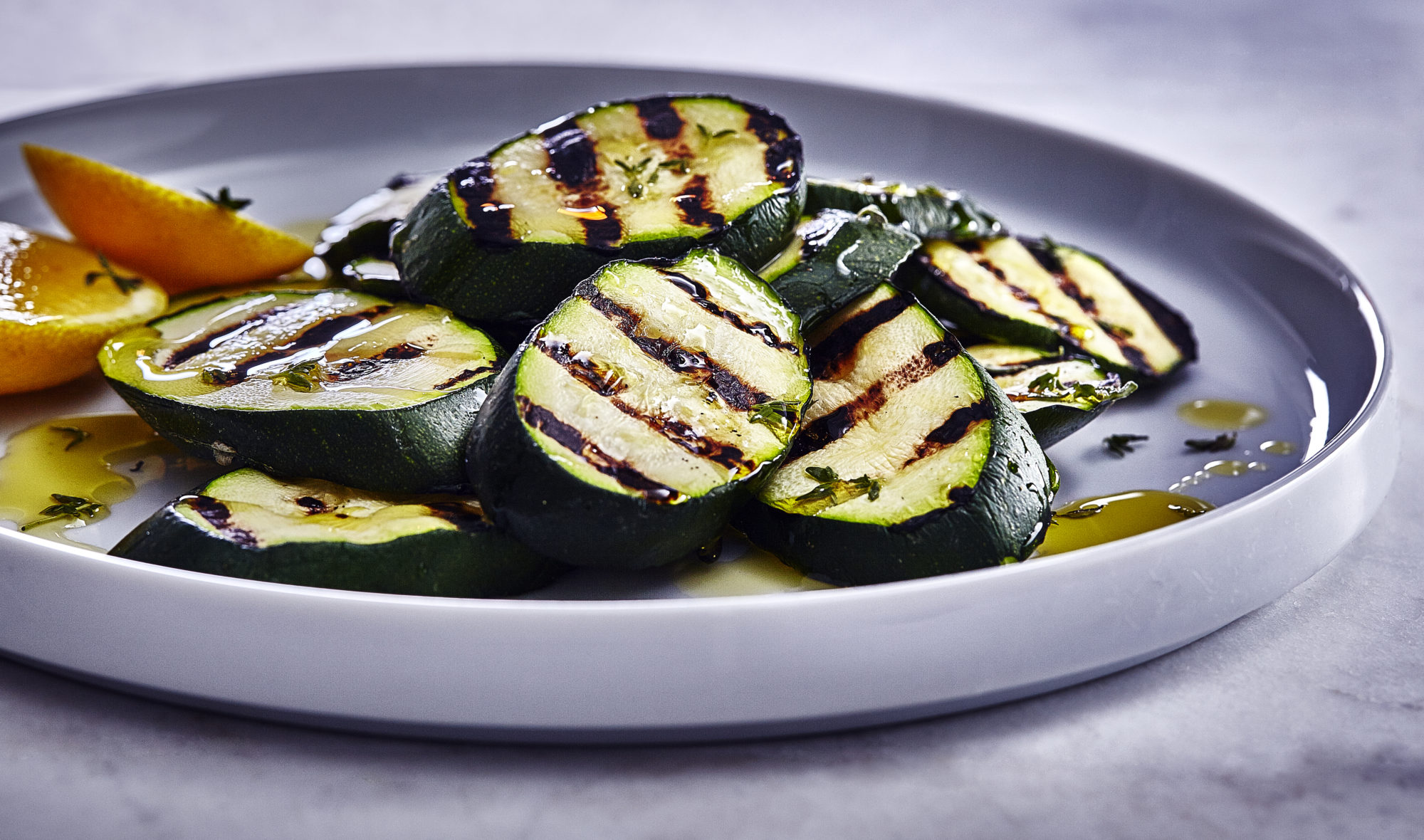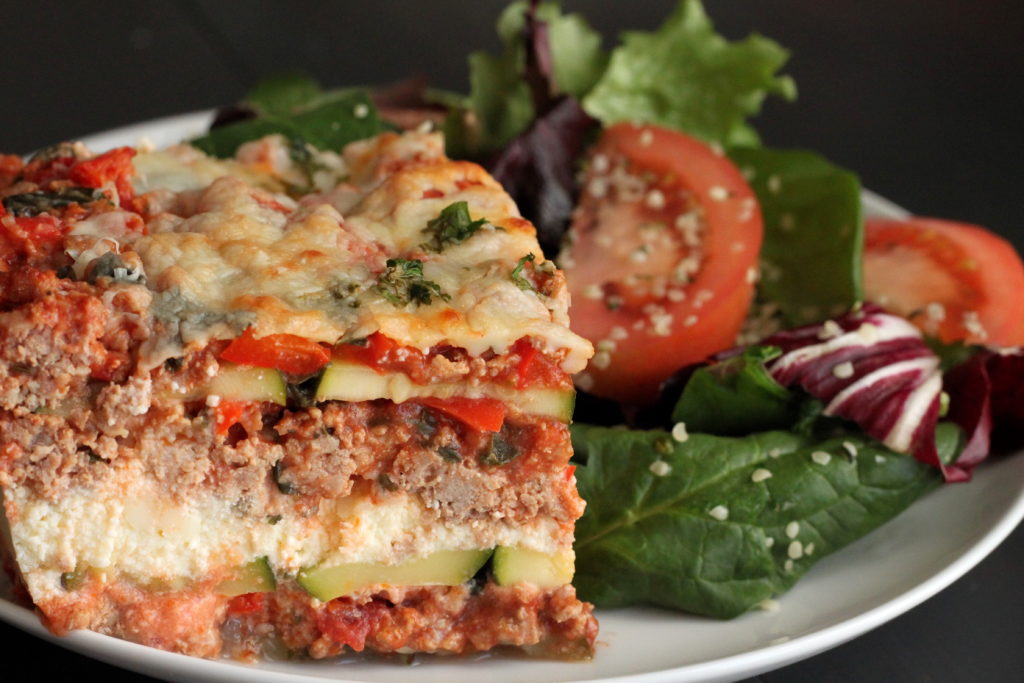
💥 SAVE 52% on the PN Nutrition Certification + Coaching Career Kickstarter Course! Ends Friday.

💥 SAVE 52% on the PN Nutrition Certification + Coaching Career Kickstarter Course!

Zucchini is a green (or sometimes bright yellow) summer squash. Packed with vitamins, minerals, fiber, carbs and even some protein, zucchini offers lots of nutritional value in a tasty package. Small, tender zucchini taste the best: buy them as young and fresh as you can. Then cook simply (try them on the grill, roasted, steamed or in a saute), or use them in baking.
Zucchini is a summer squash. While it’s typically treated like a vegetable, technically zucchini is a fruit, because it grows from the zucchini flower (which is also edible and tasty).
Note: In many parts of the world, including the UK, parts of Europe and South Africa, zucchini is called “courgette” and a fully grown zucchini is called “marrow.”
Flavorwise, zucchini is mild, slightly sweet and nutty tasting. Its texture holds up to many preparations including frying, sauteing, and grilling, making it a summer favorite.
As the name “summer squash” implies, zucchini grows in warm climates and are seasonal in the summertime — from late June through August, depending on climate. Because it is a popular vegetable, you may find zucchini in your supermarket year round.
Zucchini are green in color; the shade can range from light to dark. Little golden flecks may be noticed upon close inspection.
Aside from green zucchini, you may come across bright yellow “golden” zucchini. (Other types of summer squash exist, but these are different than zucchini, and they have a different size and shape, too.)
A zucchini’s size depends on when it is picked. Zucchini can grow up to a meter long, or they can be picked young at just a couple inches. A common size is about the length of a cigar. Generally, smaller is better: older zucchini can be tough and watery. Younger, smaller zucchini are more tender and have the tastiest flesh.
One large zucchini (about 323 grams) contains 55 calories, 3.9g of protein, 1.0g of fat, 10.1g of carbohydrates, 3.2g of fiber, and 8.1g of sugar.
Zucchini possesses many valuable minerals, including calcium, iron, magnesium, phosphorus, and plenty of potassium. They also offer lots of vitamins including vitamin A, vitamin C, vitamin K, and folic acid. As a bonus, zucchini contains antioxidants, too.
Choose young (small) zucchini rather than large, oversize zucchini.
Look for smooth, shiny skin with as few blemishes and bruises as possible.
If you ever see zucchini with flowers still attached (at a farmers’ market, for example) buy them: this is a sign of very fresh zucchini. Sometimes you can even find zucchini flowers available for purchase; they are worth trying as a treat.
Zucchini are fairly delicate, so handle them with care. Keep them in an opened plastic bag in your refrigerator’s crisper, and eat soon after purchase.
Wash the zucchini, then slice off the top stump and the very base of the zucchini.
Leave the zucchini skin on: it packs extra fiber and nutrients, plus it’s tender and mild so there is no need to remove it.
Zucchini can be cut any way you like. Larger, thicker slices are great for the grill, or for steaming. Rounds or half moons work nicely for a saute. And julienne cuts are well-suited for roasting.
Zucchini lends itself well to many types of cooking, though overcooking can cause it to become mushy. To help avoid mushiness and retain a meatier texture, sprinkle a halved zucchini generously with salt before cooking. Moisture beads will appear on top. After about 5 minutes, wipe off all the salt and moisture. This helps draw out excess water from the zucchini.
If you have a spiral vegetable slicer, try using it on zucchini to create thin, curly ribbons. Steam or boil the ribbons quickly (about 1 minute), then use as a base for pasta sauce or other toppings. Or enjoy the ribbons raw in a salad.
Zucchini is also a great addition to baked goods, including muffins, cookies, quick breads, and cakes. (Tip: if you do have large zucchini, baking is the best place to use them.)
Should you happen to get your hands on some zucchini flowers, enjoy them! Try stuffing them with a little goat cheese, dipping them in a light batter (optional) and frying till crisp in coconut or olive oil.

With 2 whopping servings of veggies per plate – you can feel pretty great about chowing down this lasagna without any sacrifice of flavor!
Prep Time: 20 minutes Cook Time: 60 minutes Yield: 8 servings
Preheat oven to 325 degrees Fahrenheit.
Slice the zucchini’s lengthwise using a mandolin or as thin as you can cut them intact (1/4 cm).
Next, chop the red pepper, onion, spinach, and garlic. Set aside.
Grate mozzarella and parmesan separately and set aside as well.
Now, add olive oil, onion, garlic, and ground turkey to a pan and cook until the turkey is half done (half pink). Add chopped pepper and spinach and cook until turkey is fully cooked (no longer pink). Drain excess liquid.
In a separate bowl, mix canned tomatoes, tomato paste, basil, parsley, oregano, and sea salt – reserve 2 tbsp and set aside. Add the remaining amount to the ground turkey and mix thoroughly. Remove turkey mixture from heat.
In a separate bowl, mix ricotta with the eggs. Set aside.
Assembly
Spread the 2 tbsp of reserved tomato mixture on the bottom of your pan (approx. 12″ x 8″ in size or 2 smaller pans) and then add the first layer of zucchini noodles (1/3 of the amount you chopped) either lengthwise or widthwise.
Add ½ of the meat mixture and then add another layer of the zucchini noodles (another 1/3 of the amount you cut).
Add the ricotta/egg mixture and lightly sprinkle ¼ cup of grated mozzarella.
Add the last layer of zucchini (last 1/3).
Add the rest of the meat sauce (if you feel like there is too much, save a little for lunch another day).
Sprinkle the remaining ½ cup of grated mozzarella, ¼ cup grated parmesan, and either ½ tsp dried parsley or 1 tbsp fresh parsley for garnish.
Bake 50-60 minutes until bubbling throughout and cheese is lightly browned on top.
Precision Nutrition’s Encyclopedia of Food expands every single month as we highlight new foods and showcase beautiful food photography. If you’d like to stay up to date, simply click this link. From there, we’ll send you a FREE copy of our recipe book. We’ll also let you know when new and delicious foods are added to the site.
Zucchini is a green (or sometimes bright yellow) summer squash. Packed with vitamins, minerals, fiber, carbs and even some protein, zucchini offers lots of nutritional value in a tasty package. Small, tender zucchini taste the best: buy them as young and fresh as you can. Then cook simply (try them on the grill, roasted, steamed or in a saute), or use them in baking.